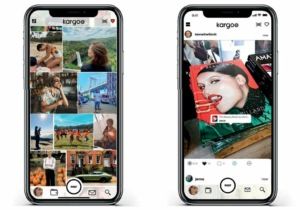News
Treat your social media content like precious cargo and take back control!
This article is more than 6 years old.
Kenneth Willardt’s kargoe app seeks to disrupt the multi-billion dollar social media influencer industry by empowering users and creators

Taking back control (ALL PHIOTOS: KARGOE)
From catching up with friends to keeping up with trends, social media sits at the nexus of our digital lives. Facebook reminds us about upcoming birthdays, Twitter dishes news faster than journalists, and Instagram shows off an internet celebrity’s new sneakers – and for some reason, it makes us want those kicks too.
Welcome to the power of social media marketing. Sandwiched between Uncle Bob’s chats and breaking news from Syria, social media influencers tout the latest trends, vacation hotspots, and commodities while projecting lifestyles we wished we had. Currently valued by Business Insider at 8 billion dollars in 2019, the influencer industry is projected to be worth up to 15 billion by 2022.
So where does all the money go? Not to your average social media user, Kenneth Willardt insists. Willardt is a Danish fash-ion photographer and campaign director who has worked with Dior, Nivea, L’Oréal and Target. Currently based in New York City, Willardt’s latest project is ‘kargoe’ – an app he bills as an alternative to social media giants.
Empowering users
With catchy headlines such as “We are done being the product for social media giants” and “Th e economy of you”, kargoe is dedicated to empowering social media users and creators to seize financial and editorial control of their content.
“Your content is your data and that is your brand.” Willardt said. “We believe strongly in that everyone should be part of that success.”
While Willardt has witnessed the changing retail market over the past decades and had noted that content creators weren’t being paid for their endorsements, he said this all clicked together one Sunday morning.
“My son came to me and said: ‘Daddy, I’ve opened up two Instagram accounts. One for my dog and one for me. But I don’t understand; why can’t I buy or sell anything?’,“ laughed Willardt.
His son’s innocuous comment made Willardt realise there was a market for taking back financial and editorial freedom for your social media data and shared content. Why should only influencers and certain brands be able to sell directly from social media, he wondered. And thus the idea for kargoe was born.
Seamless experience
The concept is simple: kargoe integrates the social media experience with the online shopping experience, seamlessly delivering both to the user in a user-friendly app.
To use kargoe, start by posting an image. Th en, tag products and brands you want to endorse on the image. Next, share the post. Now, other kargoe users can click on your product tags and directly add the items to their cart for checkout. As users check out, they can configure delivery and payment options – without leaving the kargoe app at any time.
“We believe that a six-second path to purchase is a game-changer, as opposed to 120-plus seconds on either Instagram or Facebook,” Willardt said. “There, by the time you’re ready to purchase, you’re already tired of it with all the information you have to fill out about yourself. On kargoe, we already store the information on the backend.”
Bypass the middleman
The users of kargoe can tag products that they own or produce. This is particularly useful if the kargoe user operates a small business or store selling vintage clothing. In this case, purchasers buy the product directly from the kargoe user. All the profit goes to the kargoe user.
Taking back control
Alternatively, kargoe users can tag another brand’s products in their images, thereby ‘endorsing’ these brands. In this instance, when purchasers click on that product, they are able to purchase the product directly from the brand. In return, the kargoe user who tagged the product receives a small percentage of the sale. This acts as an incentive for kargoe users to tag and represent brands that they genuinely like.
“This is a way of having everyone being empowered and having everyone being a part of the economy. Customer engagement for the brand increases, and more awareness is spread throughout social media at no cost to brands,” Willardt said.
Effectively, this also bypasses the middleman and cuts down on operational costs for brands. In fact, the brands that kargoe is working with actually make more money back than if they sold their stock to a department store, Willardt reveals.
Social responsibility
But Willlardt insists that kargoe isn’t just focused on the numbers. The bigger message, he said, is about collective social responsibility. Instead of just tagging products, kargoe users can also tag charities and prompt users to donate to them.
“Thus kargoe allows you to add purpose to all shared content, meaning you can really express yourself as a brand and as a person by adding donation links to all the things you care about and want to keep improv-ing in your life, such as cleaning up the ocean or cleaning up the air,” Willardt said.
In addition, kargoe also gives a percentage of its profits to various organisations that support the Sustainable Development Goals. “The world doesn’t need another billionaire,” Willardt insists.
Beyond the app WILLARDT’S vision for bring-ing, a particularly Danish outlook on collective social responsibility to shopping extends beyond kargoe’s social media experience. In fact, kargoe continues the user experience inside of brick-and-mortar stores.
Currently being piloted in participating stores in NYC, kargoe allows users to use the app to scan a product’s barcode. The user receives information about the product and can add it to their kargoe app shopping cart and check it out online.
Customers then show their in-app receipt to the store security before leaving the store.
Coming soon to Denmark
Currently, kargoe is in talks with several Danish brands to enable Danish kargoe users to tag and endorse these brands. By the spring of 2020, reveals Willardt, Danish users will also be able to conduct transactions in kroner instead of the default US dollar.
However, the kargoe app is already available in Denmark and kargoe users can already tag, buy, and sell goods amongst themselves. In fact, Willardt encourages users to sign up now. Instead of focusing on the big brands, Willardt says kargoe may be a way to breathe life into mom-and-pop shops.
“We need to get this idea out so everyone can have a fair part of the economy,” Willardt said. “And let’s do this before Amazon gets to Denmark.”
Download the kargoe app via Google Play or Apple app store. Learn more at kargoe.me.











































